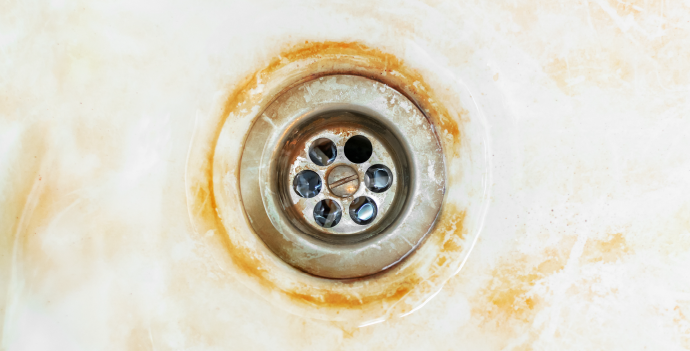Do you notice reddish-brown stains on your sinks, clothes, or appliances? Does your water taste metallic or leave a strange odor? If you rely on well water, these could be signs of iron contamination. While iron might seem harmless, its presence in your well water can lead to various issues, impacting your health, home, and budget.
Understanding Iron in Well Water
Iron is a common mineral found in soil and rocks, which can seep into groundwater, especially in areas with high iron concentrations. When you draw water from your well, you might inadvertently be drawing in iron particles as well. There are two main types of iron commonly found in well water:
- Ferrous Iron: Also known as soluble or clear-water iron, ferrous iron is dissolved in the water and usually remains colorless until exposed to air.
- Ferric Iron: Also called insoluble or red-water iron, ferric iron becomes visible when it oxidizes upon exposure to air, giving water a reddish-brown tint.
Both types of iron can wreak havoc on your plumbing, appliances, and overall water quality.
The Effects of Iron in Well Water
- Staining: Iron can cause unsightly stains on sinks, toilets, tubs, and even clothes washed with iron-laden water.
- Plumbing Damage: Iron buildup can corrode pipes and fixtures, leading to leaks and costly repairs.
- Appliance Damage: Water heaters, washing machines, and dishwashers are particularly vulnerable to damage from iron deposits, reducing their efficiency and lifespan.
- Health Concerns: While small amounts of iron are essential for health, excessive iron intake from water can cause gastrointestinal issues and contribute to the development of certain health conditions over time.
Why Removing Iron Is Cost-Effective
Although the idea of investing in water treatment might seem daunting, the long-term benefits far outweigh the initial costs. Here’s why:
- Preventative Maintenance: Removing iron from your well water helps prevent costly repairs and replacements of plumbing and appliances down the line.
- Improved Water Quality: Clean, iron-free water not only tastes better but also protects your health and reduces the risk of stains on household surfaces.
- Increased Home Value: A home equipped with a reliable water treatment system is more attractive to buyers and can fetch a higher price on the market.
- Energy Efficiency: Appliances like water heaters and washing machines operate more efficiently with clean water, leading to energy savings over time.
Cost-Effective Solutions for Iron Removal
Fortunately, there are several affordable options for removing iron from well water:
- Water Softeners: Many water softeners can effectively remove low to moderate levels of iron through ion exchange or chemical oxidation.
- Oxidizing Filters: Filters equipped with media like manganese dioxide or catalytic carbon can oxidize iron, allowing it to be filtered out.
- Aeration Systems: Aeration systems expose water to air, causing iron to oxidize and form particles that can be filtered out.
- Reverse Osmosis: While typically used for removing contaminants on a smaller scale, reverse osmosis systems can effectively remove iron when paired with pre-treatment methods.
Before investing in a water treatment system, it’s essential to test your well water to determine the type and concentration of iron present, as well as any other contaminants that may require treatment.
In conclusion, while iron contamination in well water may seem like a minor inconvenience, its long-term effects can be costly and detrimental. By investing in affordable iron removal solutions, you can safeguard your health, home, and budget in the long run. Remember, clean water is not just a luxury—it’s a necessity for a healthy and happy home.
If you’re interested in clean water in your home – schedule a free, no-obligation in-home water analysis with an Artisanal Water local expert.
Call (704) 315-6344 or fill out our contact form.
